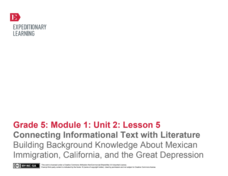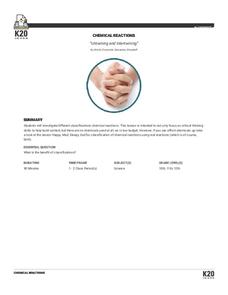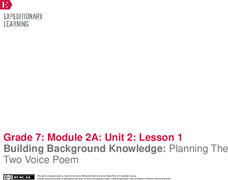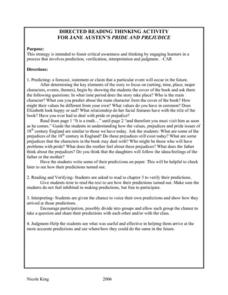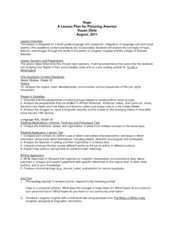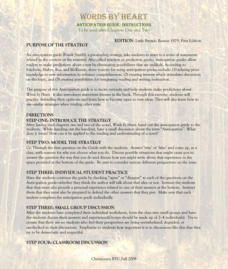EngageNY
Connecting Informational Text with Litearature: Building Background Knowledge About Mexican Immigration, California, and the Great Depression
Help your class transition as the setting in the novel Esperanza Rising, by Pam Muñoz Ryan, moves from Mexico to California. Beginning with prior knowledge, and moving into jigsaw research groups, class members add to and create posters...
Florida Center for Reading Research
Dictionary Cube
Young scholars investigate new vocabulary words with a fun, collaborative activity. Given a deck of word cards, pairs of students flip over one at a time and independently look up the term in a dictionary. They then take turns rolling a...
Scholastic
Lesson Two: The Earth, Introductory Activities
Determine what young pupils already know about earth science with a brainstorming activity. After class members work together to complete a KWL chart about the Earth, they craft an acrostic poem to demonstrate their understanding.
Florida Center for Reading Research
Comprehension: Monitoring for Understanding, What Do You Know?
An activity promotes reading comprehension. Readers analyze a text of their choice while activating prior knowledge and asking and answering questions. Scholars enforce multiple strategies to improve comprehension.
National Behaviour Support Service
Academic Vocabulary Building Activities
Suggestions for using Roberto Marzano's six-step approach to academic vocabulary instruction are detailed in a packet that includes graphic organizers, worksheets, and activities.
Chicago Botanic Garden
Micro-GEEBITT Climate Activity
A truly hands-on and inquiry based learning activity bridges all the lessons in the series together. Beginning with a discussion on average global temperatures, young meteorologists use real-world data to analyze climate trends in order...
K20 LEARN
Untwining And Intertwining: Chemical Reactions
What happened when the chemistry teacher told a bad joke? There was no reaction! A creative take on the traditional reaction types lesson invites learners to draw their own conclusions about how compounds and elements combine. Groups...
Bonneville
Probes of Prior Knowledge
A bright future learning about electricity awaits. Future scientists conduct two probes to investigate electrical energy. The first requires them to think about how electricity is made, while the second has them identify appliances that...
Curated OER
The Little Red Hen
Young readers access prior knowledge of how wheat becomes bread. Using "The Little Red Hen" story, learners make predictions of the events. Extension activities include singing a song about the story and making a list of ways to help...
EngageNY
Building Background Knowledge: Planning The Two Voice Poem
Scholars build background knowledge to understand the life and work of the union leader and labor organizer César Chávez. As they read teacher-selected resources, they complete a Building Background Knowledge worksheet and engage in...
Curated OER
Bud Not Buddy Pre-Reading Activity
Before you embark on reading Bud Not Buddy with your class, have them imagine they are in Bud's shoes. They must prioritize which of 13 items listed on a printable worksheet they would take with them to survive as a Depression-Era...
Bantam Books
The Martian Chronicles: K-W-H-L Activity
Prepare your class for a unit on Ray Bradbury's The Martian Chronicles with an activity that works for pre-reading, during reading, and post-reading. Learners fill out a K-W-H-L chart to reflect on what they already know, what they'd...
Columbus City Schools
You Can’t Sneeze On This Tissue
Take your class' understanding of cells to the next level... or levels! Demonstrate the levels of organization using a variety of engaging methods. The teacher's guide includes the materials you'll need to execute a flower dissection,...
Curated OER
Pride and Prejudice: Directed Reading Thinking Activity
Can you judge a book by its cover? Decide who and what Jane Austen's Pride and Prejudice is about with a prediction activity. Before reading the first three chapters of the book, kids answer questions based on their interpretation of the...
Bantam Books
The Tempest: Fishbowl Discussion Strategy
Readers learn together with a group discussion activity. As they read William Shakespeare's The Tempest, high schoolers prepare for a fishbowl discussion in which three or four learners sit in the middle of a large circle and have a...
Curated OER
Prime Factorization: Finding Factors in the Fifth Grade
The lesson starts out with a brain drain, which is a great way to get students to activate prior knowledge and build lasting connections. They tell everything they know about prime factorization, use their knowledge to...
Curated OER
Picturing America: Images and Words of Hope from Romare Bearden and Langston Hughes
A carefully crafted three-day lesson integrates poetry and visual art. By analyzing and comparing Langston Hughes' poem "Mother and Son" and Romare Bearden's collage "The Dove," readers explore the theme of hope. The lesson activates...
Project Maths
Introduction to Trigonometry
The topic of trigonometric ratios is often covered with loads of rote memorization baked into the activity. This activity set, however, leans more on using similar triangles and discovery learning to help young geometers develop a deeper...
Novelinks
Words By Heart: Anticipation Guide
The anticipation guide for Words by Heart is the first of a series of six, contains lesson plans for the activity as well as a handout to be completed individually, in pairs, or as a class. It sparks interest for the text and activates...
Curated OER
A Look at Exclusion Through Improvisation
Building a realistic understanding of the trials Jews suffered during WWII isn't always easy. This plan employs student constructed dramatic freeze frame scenes to help build a deeper understanding of Jewish Ghettos, concentration camps,...
National Security Agency
Classifying Triangles
Building on young mathematicians' prior knowledge of three-sided shapes, this instructional activity series explores the defining characteristics of different types of triangles. Starting with a shared reading of the children's book The...
Give and Let Live
Blood and Transplant: Blood
Why is blood donation so important, anyway? Science and health classes across multiple grades benefit from an in-depth look into the need for and process of blood donation. With an emphasis on presenting the topic in a non-threatening...
Curated OER
Myth Lesson Plans
What is the difference between myths, legends, and folktales? From greek mythology and creation myths to heroes and heroines, here is a nice series of lessons for providing your kids with solid foundational knowledge about myths.
American Chemical Society
Energy Changes in Chemical Reactions
Some chemical reactions produce heat, but what is really going on? Lesson focuses on the concept of energy changes, both exothermic and endothermic. Scholars perform multiple experiments, hands-on activities, and view videos of the...


